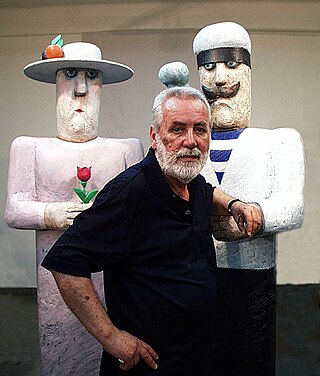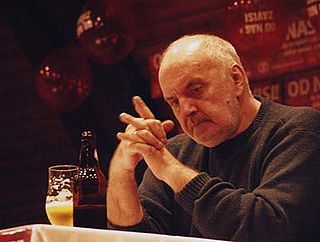This article needs additional citations for verification .(April 2024) |
Nedjeljna Dalmacija was a Yugoslavian regional weekly newspaper based in Split, Croatia. [1] Its publisher was Slobodna Dalmacija. [1]
This article needs additional citations for verification .(April 2024) |
Nedjeljna Dalmacija was a Yugoslavian regional weekly newspaper based in Split, Croatia. [1] Its publisher was Slobodna Dalmacija. [1]
Toma Bebić was a Croatian multidisciplinary artist: musician, writer, actor, painter and poet. During his life he worked as a navy officer, police inspector and journalist for "Nedjeljna Dalmacija" and "Vjesnik". He published six books of aphorisms, few books of poetry and one children's picture book.
Feral Tribune was a Croatian political weekly magazine. Based in Split, it first started as a political satire supplement in Nedjeljna Dalmacija before evolving into an independent satirical weekly in 1993. It became a popular political weekly in the 2000s before ceasing publication in June 2008.
Vjekoslav Perica is a Croatian historian, journalist and writer who specializes in the modern history of religions in the former Yugoslavia.

Slobodna Dalmacija is a Croatian daily newspaper published in Split.
Mate "Mišo" Kovač is a Croatian recording artist. He is the best selling artist from Croatia and former Yugoslavia, with well over 20 million records, cassettes and compact discs sold to date, and is often regarded as one of the most popular musical performers from Southeastern Europe.

Yugoslavia participated in the Eurovision Song Contest 27 times, debuting in 1961 and competing every year until its last appearance in 1992, with the exceptions of 1977–1980, and 1985. The Yugoslavian participant broadcaster in the contest was Jugoslavenska radiotelevizija (JRT) which selected its entrant with the national competition Jugovizija. Yugoslavia won the 1989 contest and hosted the 1990 contest.

Aleksandar Tijanić was a Serbian journalist and director-general of the country's public broadcaster Radio-Television of Serbia from 2004 to 2013. During his career he was a star columnist for leading newspapers and magazines published in SFR Yugoslavia and Serbia, editor in chief of several prominent television stations, political advisor to prominent Serbian politicians, and Minister of Information for four months in 1996 in the government headed by Mirko Marjanović during the rule of Slobodan Milošević.
The Gospić massacre was the mass killing of 100–120 predominantly Serb civilians in Gospić, Croatia during the last two weeks of October 1991, during the Croatian War of Independence. The majority of the victims were ethnic Serbs arrested in Gospić and the nearby coastal town of Karlobag. Most of them were arrested on 16–17 October. Some of the detainees were taken to the Perušić barracks and executed in Lipova Glavica near the town, while others were shot in the Pazarište area of Gospić. The killings were ordered by the Secretary of Lika Crisis Headquarters, Tihomir Orešković, and the commander of the 118th Infantry Brigade of the Croatian National Guard, Lieutenant Colonel Mirko Norac.

Vasko Lipovac was a Yugoslavian and Croatian painter, sculptor, printmaker, designer, illustrator and scenographer and one of the most prominent artists of the region. He is best known for his minimalist figuration and use of intense, unmodulated and often dissonant palette. With the exception of his juvenile period of geometric abstraction, he remained loyal to figuration throughout his whole career. Exceptionally prolific, he worked in various techniques and was equally skilful in using high-polished metal, polychromous wood, enamel, terracotta or polyester to create his sculptures, reliefs and mobiles.

Capital punishment was used from the creation of the modern Serbian state in 1804. On 26 February 2002, the Serbian Parliament adopted amendments striking it off from the Criminal Code. The last execution, by shooting, took place on 14 February 1992, and the last death sentences were given in 2001. Serbia is bound by the Second Optional Protocol to the International Covenant on Civil and Political Rights, and Protocols No. 6 and No. 13 to the European Convention on Human Rights. According to Article 24 of the Serbian constitution (2006): "Human life is inviolable. There shall be no death penalty in the Republic of Serbia".

The Order of the Yugoslav Star was the highest national order of merit awarded in Yugoslavia. It was divided into four classes. The highest class, the Yugoslav Great Star was the highest state decoration awarded in Yugoslavia. The order was mostly awarded to foreign heads of state for the development and strengthening of peace and cooperation between nations.
The 1993–94 Croatian Football Cup was the third edition of Croatia's football knockout competition. Hajduk Split were the defending champions, and the cup was won by Croatia Zagreb.
The 1996–97 Croatian Football Cup was the sixth edition of Croatia's football knockout competition. Croatia Zagreb were the defending champions, and they won their second successive title.
The 1997–98 Croatian Football Cup was the seventh edition of Croatia's football knockout competition. Croatia Zagreb were the defending champions, and they won their third successive title.
House on the Sand is the only feature film directed by Ivan Martinac, one of the key figures of Croatian avant-garde and underground film scene.
Nedjeljni Jutarnji is the weekly Sunday edition of Jutarnji list, one of the two prominent dailies in Croatia. Nedjeljni is principally concerned with life, culture, politics and style. Founded by Tomislav Wruss in 2003 in the long tradition of Croatian Sunday papers such as Nedjeljna Dalmacija, it was brasher and less polite than the daily edition of Jutarnji.
Dubravko Mataković is a Croatian illustrator best known for his grotesque comic books.
Aleksandar Dragaš is a Croatian rock critic and journalist. He has been described as one of the most prominent and influential Croatian music critics.

Petar Luković, nicknamed Pero s onog sveta(transl. Pero from the Great Beyond), was a Serbian journalist, newspaper editor and onetime rock critic. He attended the Sixth Belgrade Gymnasium, and graduated from the Faculty of Mechanical Engineering at the University of Belgrade.